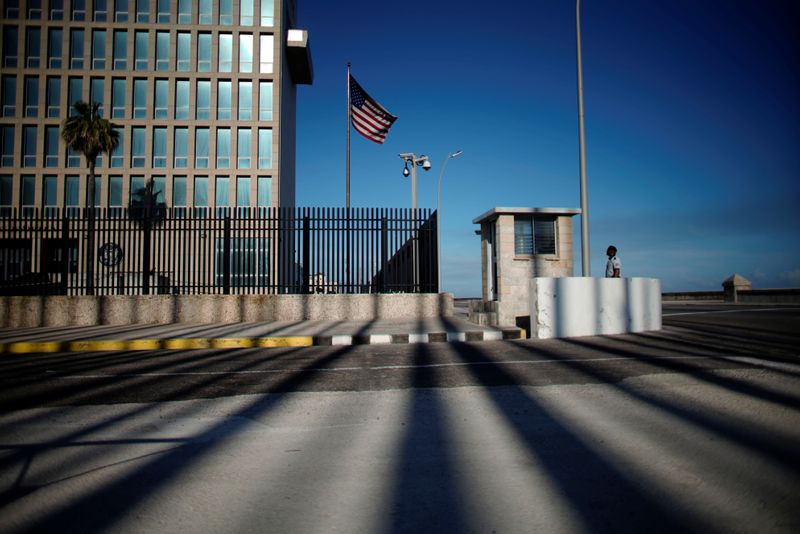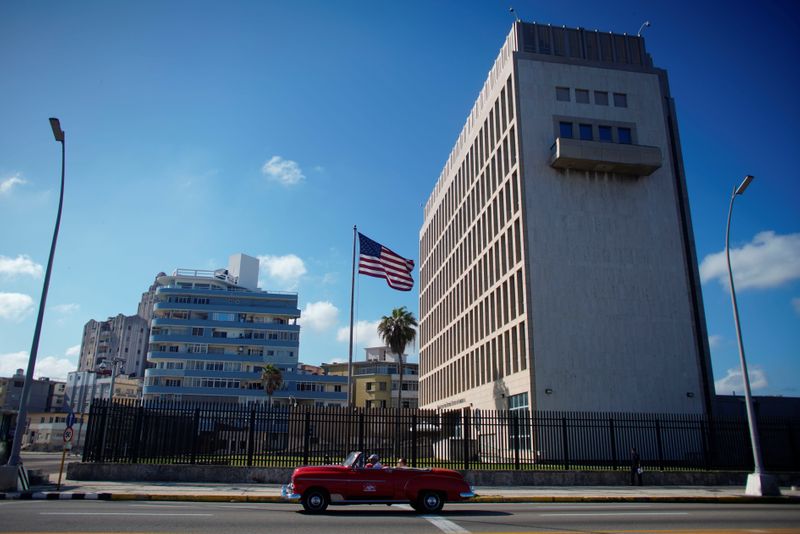By Matt Spetalnick
WASHINGTON (Reuters) - The United States is considering returning Cuba to its list of state sponsors of terrorism, a senior Trump administration official told Reuters on Thursday, a move that would mark another major blow to increasingly tense relations between Washington and Havana.
There is a “convincing case” that Cuba should be placed back on the U.S. blacklist, in part because of its continued backing for socialist Venezuelan President Nicolas Maduro and the refuge it gives to leaders of Colombia’s ELN rebel group, the official said.
Speaking on condition of anonymity, the official did not rule out that a decision on Cuba’s re-listing could come by the end of the year.
In what was possibly a preliminary step, the Trump administration said on Wednesday it had put the Communist-ruled island back on a separate list of countries that do not cooperate fully with its efforts to counter terrorism.
Havana, which has long denied any link to terrorism, dismissed Wednesday's State Department announcement as "spurious."
Returning Cuba to the blacklist would be a further rollback of the detente that former President Barack Obama orchestrated between the old Cold War foes. His decision to formally remove Cuba from the terrorism list in 2015 was an important step toward restoring diplomatic ties that year.
Trump’s toughened stance on Cuba, as well as Venezuela, has gone down well in the large Cuban-American community in south Florida, an important voting bloc in a key political swing state as he seeks re-election in November.
Designation by Washington as a state sponsor of terrorism, which carries the potential for sanctions and trade restrictions, would put Cuba in the company of Iran, North Korea, Syria and Sudan.
CUBA'S ROLE IN VENEZUELA
Any decision to put Cuba back on the list would take into account Havana's support for Maduro, whose 2018 re-election was considered a sham by most Western countries. The U.S. government indicted him and much of his inner circle in March on charges of "narco-terrorism" conspiracy, corruption and drug trafficking.
The United States and dozens of other nations recognized opposition leader Juan Guaido as interim president last year. But Maduro, who calls Guaido a U.S. puppet, remains in power, backed by Venezuela's military as well as Russia, China, Cuba and Iran.
Some U.S. officials have said privately that this has been a growing source of frustration for Trump.
The senior official said the U.S. government was also considering designating several of Venezuela's security services as terrorist organizations, in part for alleged links to drug trafficking. Those include the national intelligence service, the military counterintelligence agency and elite police unit, in addition to paramilitary groups loyal to Maduro.
The deliberations on whether to re-list Cuba are focused heavily on legal questions required to justify naming a country a sponsor of terrorism, the official said.
Also figuring into the discussions is Cuba's refusal of Colombia's request to extradite ELN leaders after the group claimed responsibility for an attack at a Bogota police academy in January 2019 that killed 22, the official said.
The leaders of the National Liberation Army (ELN), the largest active guerrilla group in Colombia, traveled to Havana as part of peace negotiations that collapsed last year after the car bomb attack.
Cuba has received broad plaudits in the past for hosting the successful peace talks between the Colombian government and the former FARC rebel army.
Another issue expected to weigh on Washington's decision is Cuba's harboring of several U.S. fugitives, some of whom have lived on the island for decades.
A re-listing of Cuba would have heavy symbolic meaning for Havana, which had chafed for decades under the U.S. designation.
It is unclear, however, how much practical impact there would be.
The designation carries a prohibition on U.S. economic aid, a ban on U.S. arms exports, controls on “dual-use” items with military and civilian applications, and a requirement that the United States oppose loans to Cuba by international financial institutions such as the World Bank and International Monetary Fund.

But many of those restrictions are already in place - or have even been tightened by Trump - and a decades-old U.S. economic embargo remains and can only be lifted by Congress.
